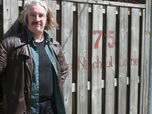By rob mclennan
You can't step into the same river twice, at least according to Heraclitus. Saskatchewan poet John Newlove made a reference to such in one of his poems, "You Cannot Step Twice" from Black Night Window (1968), and I've sprinkled it, somehow, into pieces of mine every couple of years since. It's a powerful idea, different thoughts on the difference of same. In one poem, I even went as far as to say that it might be a different river, but since your shoes and socks still get equally wet, it might as well be the same.
shipbuilding (foundation
you were writing a paper on marriage
& wherein lies the question
, a question of lies
i was working on a poem
on the ottawa river
how you cant step into
the same truth twice
arriving too early for dinner, i read
an essay on homemade beer
by paul quarrington
you couldnt work with me in the room
i tried not to laugh out loud
at the essay, not at you,
half a glass of merlot
i could tell that you
were not impressed
i pictured a lemon, the shape
of an hour
The lemon is another sly theft from Alberta writer Robert Kroetsch, riffing off Wallace Stevens' infamous poem about blackbirds, another line leading directly to another line. Can literature ever exist on its own? No matter how hard we try, we can no easier create art out of nothing than become our own parents; there is always a place where we begin, outside and before ourselves. The woman I was spending time with during this poem was far more trouble than she was worth and has long since been excised, although she still has a couple of my books I want back. I really should have learned long ago not to loan anything to anyone.
This piece is a part of The Ottawa City Project (Chaudiere Books, 2007), the book on the city I managed to somehow return to at 19, and from the section on Ottawa's old lumber-town history from the Victorian era, making fortunes for lumber barons Booth, Eddy. A foundation of ships long since taken down, once the British no longer needed our Ottawa Valley timber for masts. This is the river the English called Ottawa and the French called les Outouais, originally called Grand by the European influx, not figuring to ask what the locals still knew it as. Champlain and others who navigated its shores, what we swam ourselves in under Canada Day fireworks in 1996, perhaps troubling our still-future health for the filth of the Ottawa River, ash floating down on our floating heads.
Around the same time, I was reading Robert Legget's Ottawa Waterway: Gateway to a Continent (University of Toronto Press, 1975) for the sake of research on my travel book, Ottawa: The Unknown City (Arsenal Pulp Press, 2008), working through the Outaouais, the Algonquin, Samuel de Champlain and the steam ships and the advent of rail that took out the steam ships, and even the advent of cars that took out the rail.
For a couple of decades before and just at the turn of the 20th century, there was a hot springs in eastern Ontario, downriver some, just before the Quebec border, as the Bytown & Prescott Railway Company making regular trips to Caledonia Hot Springs, where heads of state and even royalty would visit for the springs? healing powers. What is it about history? It's difficult to even find references to such, and there are barely stones in the field to mark where the buildings once sat, completely erased, it seems, despite the trains and the steam ships that took important passenger cargo to visit, including British royalty and various heads of state. How does something so grand disappear so completely, so quickly? So far, the only book on the Caledonia Hot Springs was written and published in French; I await the translation, so I don?t have to write the same thing myself. Will it ever happen?
 |
Born in Ottawa, Canada?s glorious capital city, rob mclennan currently lives in Ottawa. The author of more than twenty trade books of poetry, fiction and non-fiction, his most recent titles are the poetry collections Glengarry (Talonbooks, 2011), kate street (Moira, 2011) and 52 flowers (or, a perth edge) (Obvious Epiphanies, 2010), and a second novel, missing persons (2009). An editor and publisher, he runs above/ground press, Chaudiere Books (with Jennifer Mulligan), The Garneau Review (ottwater.com/garneaureview), seventeen seconds: a journal of poetry and poetics (ottawater.com/seventeenseconds) and the Ottawa poetry pdf annual ottawater (ottawater.com) . He spent the 2007-8 academic year in Edmonton as writer-in-residence at the University of Alberta, and regularly posts reviews, essays, interviews and other notices at robmclennan.blogspot.com
Photo of rob mclennan by Christine McNair |
Post new comment